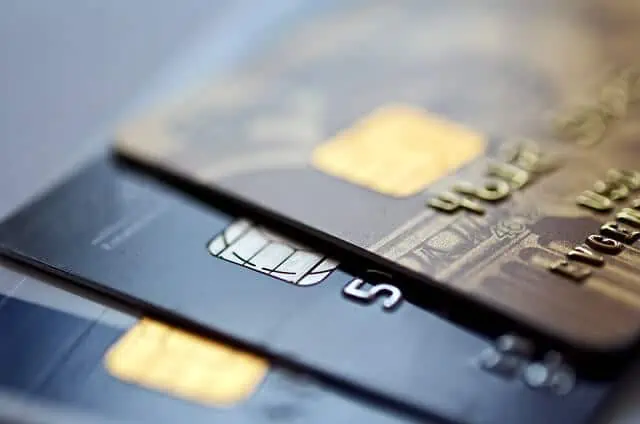We all know poor credit can affect our chances of getting approved for mortgages, auto loans, credit cards, and more. But can previous financial hardship affect whether an employer decides to hire you? The answer is that it depends on where you live, what type of job you’re applying for, the types of negative marks on your credit history, and more.
Let’s take a look at what exactly employers can and can’t see with credit checks, how likely it is to affect your hiring prospects, and if it harms your credit score. We’ll also dive into your rights regarding an employer credit check, how to check your credit history (and fix inaccuracies), and more.
Featured Financial Products
Table of Contents
Can Bad Credit Affect Getting a Job?
Many employers won’t ask to do a credit check. However, poor credit history can affect your job prospects for some jobs.
The jobs most interested in your credit history tend to come in the financial sector, but also entities like casinos, law firms, prisons, law enforcement, military, and other government jobs.
If you work in a position requiring security clearance, you’ll have a higher likelihood of the potential employer running a credit check on you.
Employers need your permission to conduct a credit check on you. They see a limited report, which doesn’t include your credit score. If you give consent for them to see your credit history and it has derogatory marks on your report, it might affect whether they choose to hire you.
You can deny an employer credit check request, but the hiring company may end the hiring process. In some states, state laws prevent you from disqualification because of your credit report (more information on this later).
Related: How Parents Can Help Their Children Start to Build Credit
Can Employers Check Your Credit?
Yes, a prospective employer can check your credit report. However, they need your written consent first. If you give the employer permission, they can see your credit history but can’t see your exact credit score.
The information available to the employer includes your account balances, payment history, derogatory credit marks (such as bankruptcy or foreclosure), and more. Employers won’t see your account numbers or other personal information.
If a potential employer runs a credit check on you, they must also run checks on other applicants for the role. It’s discriminatory only to check some applicants’ credit history.
You can deny a credit check, but that might be suspicious to some employers.
Related: Best Credit Cards for No Credit History [Starter Credit Cards]
Why Do Employers Check Your Credit?
Many jobs don’t require credit checks. However, for the ones that do, they often have good reasons.
For instance, a job in a financial field may see your personal finances reflecting how well you would provide financial advice to others.
Managerial positions sometimes take your credit history to indicate how you handle company finances. Missed payments might be a sign you’re unorganized.
When someone appears financially stressed, one study shows that person has a higher likelihood to commit fraud or steal from a company.
When applying for a job with the government, they may check your financial history to see if you have a pressing financial need and thus accept bribes to pay off debt. Usually, a company won’t check your credit unless you have neared the hiring stage.
It isn’t just new employers who want to check credit histories. A business may also want to conduct one before giving you a promotion, access to company money, or allowing you to see sensitive customer data.
Featured Financial Products
Related: How Old Do You Have to Be to Get a Credit Card?
What do Employers See When They Check Your Credit?
Employers don’t see your entire credit report but rather a modified version. Your credit score remains left off in addition to any information that could violate equal employment regulations.
Personal information, such as your birthday or complete account numbers, remains hidden as well. Employers see similar information to what lenders see.
It will show credit history details, such as your available credit, card balances, and if you make payments on time. The report will also show loans, bankruptcies, foreclosures, collection amounts, your past employment, insurance, and other general information.
Related: How to Get a Credit Card for the First Time: Starter Credit Cards
Do Employer Credit Checks Appear on Your Credit Report or Affect Your Credit Score?
No, an employer credit check will not appear on your credit report or affect your credit score. These credit checks count as soft inquiries, not hard inquiries.
Even if several employers check your credit in a short timeframe, this won’t harm your credit score.
Can You Be Denied a Job Because of Bad Credit?
Poor credit scores can’t directly cause you to be denied a job because employers can’t see your numerical credit score. However, if you give a potential employer permission for a credit check, the company can see general information on your credit report.
The information on your credit report can influence an employer’s decision about whether or not to hire you. Employers can’t deny job applicants employment in several states because of their credit health (exceptions apply).
Your local department of labor can give you information on the rights for your state. In states where credit history can affect job prospects, the company must inform you that your credit check served as one of the reasons they chose not to hire you.
Does Bad Credit Show Up on a Background Check?
Background checks don’t show credit scores or any of your credit history.
A credit check is different. It also won’t show a credit score. Still, it can show other aspects of credit histories, such as delinquent payments for credit card companies or how much debt you have on credit cards.
Your potential employer must obtain written permission to perform a background and/or credit check.
Further, you must receive a notice which includes a copy of the consumer report used to make a decision and a copy of “A Summary of Your Rights Under the Fair Credit Reporting Act.”
Know Your Rights Under the Fair Credit Reporting Act
The Fair Credit Reporting Act (FCRA) provides you with several rights for employer credit checks.
First off, if you have bad credit and employment background check expectations, don’t worry about the employer checking your credit without your knowledge. A prospective employer needs your signed permission before running credit or financial checks (with a few exceptions).
The employer must explain the credit check requirement and how it plans to use your information. If you consent to the check, clarify if you’ve consented to a one-time check or continual checks throughout your employment.
You also have the right to know if an employer denied you a job because of your credit report. Employers have a legal obligation to share the credit report they looked at to make that decision. They must give you a summary of your FCRA rights too.
Finally, you have the right to dispute the report. You may find inaccuracies in your credit report that disqualified you from the job.
If you explain inaccuracies to a company, you should also file a dispute with the three major credit bureaus (Experian, Equifax, and TransUnion).
Related: How to Remove a Charge-Off Without Paying [2 Steps to Follow]
Can Debt Prevent You From Getting a Job?
Whether or not debt can prevent you from getting a job will depend on your profession, state, and extent of your debt. Many entry-level jobs won’t ask to conduct a credit report.
Some fields don’t care about your debt, and some states have laws prohibiting credit checks for certain professions.
An employer can’t disqualify you for a job due to information contained on your credit report in the following states (with some exceptions):
- California
- Colorado
- Connecticut
- Delaware (public employees only)
- Hawaii
- Illinois
- Maryland
- Nevada
- Oregon
- Vermont
- Washington
In states where your credit history can disqualify you from a job, the employer has to inform you that part of the reason you didn’t get the job was the credit check.
Suppose you think your reported credit history has an inaccuracy. In that case, you can dispute it with the credit bureau(s) and explain the error to the potential employer.
You could also show them a modified credit report if they fix the errors. Note that if your credit history affected you not getting a job, it isn’t because of your overall credit score.
Employment credit checks don’t show credit scores but show late payments, derogatory marks, and other general information. Some employers check credit as a technicality, while others consider it an important hiring criterion.
For example, suppose you want a job at a financial institution. In that situation, employers often see your credit history as an insight into whether you’re financially knowledgeable enough to give others personal finance advice.
Featured Financial Products
What is Considered a Bad Credit Score for Employment?
Employers can’t see your credit score when they request your credit report. While credit scores themselves don’t affect whether an employer from your job search hires you, the other information on your credit report could impact you.
An employer can’t see your personal information, such as your marital status or account numbers, either. They can only see your payment records, available credit, how much you owe, and other parts of your credit history.
Rather than focusing on your credit score, check if your credit history contains any red flags to employers. For example, if you have a lot of late or missed payments, employers might take it as a sign of poor organization.
If you have a significant amount of debt, you might be willing to take bribes to reduce that debt.
Consider checking your credit reports for errors. You need to give employers written permission to do a credit check in most situations. Since you know to expect a credit check, you can prepare.
Make sure all your bills are paid on time, and don’t use too much of your available credit. If you have negative entries, be prepared to explain them or proactively explain them without being asked.
How Can You Check Your Credit Reports?
You can get a free credit report from the major credit bureaus (Experian, Equifax, and TransUnion) at AnnualCreditReport.com. Each bureau must provide you with a free credit report every year.
Errors occur all the time on credit reports, so check to make sure all of your information is current and accurate. It can take weeks or months for a credit bureau to fix an error, so be proactive in checking before an employer does.
Related: Best Credit Cards for Students with No Credit [Building Credit]
How to Fix Inaccurate Credit Report Information
Suppose you find inaccuracies in your credit history. The data each credit bureau has may differ slightly, so you should check the credit reports from every credit bureau.
In that situation, you can directly contact the lender or file a dispute with whichever of the three credit bureaus has incorrect information on their credit reports.
Each bureau has its process for disputing claims, but they reflect similar steps. Explain the error in writing.
Use the credit bureaus’ dispute form (where applicable), include copies of documents that prove your dispute, and keep records of what you send. Send it by certified mail and get a return receipt so you can prove the bureau received it.
The bureau has 30 days to investigate your dispute. They must provide your dispute results in writing. If they make any changes to your credit report due to their findings, they must send you a free copy with the changes.
Related: What is a Credit Card Charge Off & What Happens if You Get One?
How to Prepare for an Employer Checking Your Credit
Since employers need your written permission to do a credit check, you’ll know if they plan to look at your credit report. Always check to ensure your credit report has accurate information, as explained in an earlier section.
Let’s say there are no errors, but your report will still look unattractive to employers. You can try contacting your lenders and asking about your options.
They might help by increasing your credit line (make sure it wouldn’t be a hard inquiry), which would decrease your credit utilization. The lender could also reduce your payment amounts or defer loans, making it easier for you to make all of your payments on time.
Make a plan for improving your credit, and be ready to share the plan with potential employers.
Featured Financial Products
Related: Best First Time Credit Cards [Beginners’ First Time Credit Cards]
Ways to Minimize Your Credit Report’s Impact on Employment
If you know your credit report will look bad to employers, there are ways you can minimize the negative impact. Be proactive and plan what to say if they ask about your poor credit history.
You may even want to bring it up yourself and explain any major life events that affected your credit. For example, you might have medical debt because your spouse needed a series of surgeries.
Tell them how the surgeries are complete and once your spouse heads back to work, you will pay off the debt quickly. Let them know you have a personal finance plan for how to reduce your debt, make on-time payments, etc.
If you don’t bring it up on your own and then don’t move on in the hiring process, consider writing a short explanation statement as they may reconsider you for the position.
As a worst-case scenario, you may have to open your job search temporarily to less competitive companies, freelance, or get a job in another field until your financial health improves.
Start taking steps to improve your credit now, and the negative items on your credit report won’t look as bad in the future.
As a bonus, the better your credit history, the higher your credit score. Employers can’t see your credit score, but having a good credit score has other advantages for other aspects of life.
Employers might also have hesitation about hiring people with no credit history. People may not seem like qualified candidates for financial positions, for example, if they can’t show they can manage their finances.
If your financial history is lacking, consider building a credit history sooner rather than later.
Related:















![How to Get Free Money Now [13 Ways to Earn Money Today] 26 how to get free money](https://youngandtheinvested.com/wp-content/uploads/how-to-get-free-money-600x403.webp)

![8 Best Debit Cards for Teens [Reviewed by a CPA + Father] 28 best debit cards for teens hires](https://youngandtheinvested.com/wp-content/uploads/best-debit-cards-for-teens-hires-600x403.webp)
